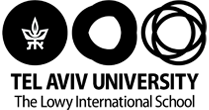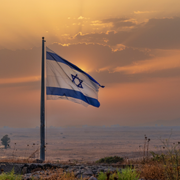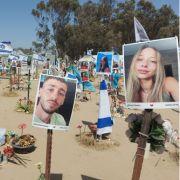Honoring the Victims and Heroes of the October 7 Massacre
Tel Aviv University marks one year of remembrance
On October 7, 2024, Tel Aviv University (TAU) held a ceremony to mark one year since that very dark day on October 7, 2023, when Hamas launched a massacre in the south of Israel that killed approximately 1,200 people, mostly civilians, and resulted in 250 taken hostage and others injured, traumatized, sexually assaulted and displaced. On that day, so many others across the nation were called up to defend their families, friends, neighbors, and the country.
During the ceremony, we heard from the president of TAU, from friends and family of those who died on October 7 or since then, as well as from some of our students who served in the IDF.
Here is some of what was shared during the ceremony.

Prof. Ariel Porat, President, Tel Aviv University
A year has gone by since Israel went through the most terrible calamity in its history, the Jewish people's worst disaster since the Holocaust. A year has passed, and 101 hostages are still held by Hamas in the dreadful tunnels of Gaza, with no rescue in sight. A year has passed, and almost every day we hear of more soldiers killed or wounded.
A year has passed, and most evacuees, from the north and south of Israel, are still refugees in their own land. A year has passed since that horrible Saturday, and as time goes by we discover that very few of those accountable for the bloody fiasco are willing to take responsibility.
Read the full speech here.

Gal Itzkovitz, Social Sciences Student, Tel Aviv University
Close Friend of Nova Festival Victim Bruna Valeanu
Bruna Valeanu, our beloved,
Born in Brazil, as a teenager she was part of Bnei Akiva and deeply wanted to move to Israel. Her dream came true, and she made aliya at the age of 15. From the big city of Rio de Janeiro, she moved to the small town of Petah Tikva. It was certainly strange for her, without knowing Hebrew. A small family, a mother and two daughters, they came to Israel because of their love for the country and Judaism that was important to them.
Bruna finished high school speaking amazing Hebrew, and everyone fell in love with her at first sight. That’s all her teacher could talk about when we met her for the first time during the shiva (mourning). Right after high school, she joined the army. No less, she became a shooting instructor in the armored corps, teaching soldiers how to use their personal weapons! She had a meaningful service and truly enjoyed it, and of course, her Hebrew only improved.
After her release from the army, like many soldiers, she decided to travel through South America, and among other places, she visited Brazil to see her family. She spent several months there, and upon returning to Israel, she realized she wanted to study, to expand her knowledge and do something that had never been done in her family before.
The youngest daughter in the house, with her blue eyes and a gaze that always wanted to study and learn, chose to study at Tel Aviv University—the place where she most wanted to get an education and acquire knowledge.
And as soon as she said the name of her major, “Anthropology,” her Portuguese accent came out, and I couldn’t help but fall in love with her from the first day of class. During that year, Bruna gained knowledge and also made lifelong friends.

She decided to work to support herself, and of course, also to help her family. Due to her studies in Tel Aviv, she moved to the big city, spent almost every evening going out. She enjoyed life, but also worked very hard for it.
After the school year ended, Bruna, along with friends from work and friends from Brazil who made aliya with her to Israel, decided to go to a party, the "Nova Party."
She didn’t even know exactly where it was going to be, just that it was in the south of the country. They arrived at the party relatively late, and in the car with her were two friends from work, Yair and Liam. As you know, at 6:30 a.m. was the cursed hour. Yair decided he was going to drive home after the first sirens, but Bruna and Liam chose not to join him.
In a perfect world, that’s the right thing to do—to not get in a car with a drunk driver. He drove home and made it safely. Bruna and the other friend hid for almost three hours until that horrible moment when her life ended.
We found out about her death on Tuesday, October 10, 2023. We were at her mother’s house when my friends went to give the police additional DNA samples of Bruna, as they had requested. Just as they left the house, the soldiers arrived, exactly like in the movies, just as they describe. It’s a moment that will be etched in my mind forever.
But what’s more important to remember is Bruna and who she was in this world. Bruna left behind a great light. As you can see in the video, she was always smiling—the most radiant person I’ve ever met. Always warm, embracing, and loving, knowing just the right thing to say.
I miss her terribly. She’s greatly missed at the university, in my life, and in the lives of everyone who crossed paths with her.
Bruna, to me, isn't just a friend; she is a model of a pure, optimistic, beloved, and smiling young woman. It’s impossible to describe her in words. Anyone who encountered her was lucky. I was lucky to be her friend for that amazing year.
She had so many aspirations and dreams. I promised myself that as long as I’m here, I won’t give up on my own dreams, I’ll try not to complain about the small things of daily life, and I’ll try to enjoy life as much as possible, like Bruna would have done—for her and for me.

Gil Lior, Medical Student and PhD Candidate, Tel Aviv University
Hello. My name is Gil Lior, I am a medical student and a PhD candidate in cancer genetics. During the war, I served 40 days in the reserves with the Yahalom unit, a special engineering unit in the Combat Engineering Corps. My team and company were responsible for engineering missions such as demolishing structures and locating shafts and tunnels.
I think many of us feel somewhat strange attending a gathering for an event that is still ongoing and unfolding. The pain is fresh, and there is little certainty about the near future.
However, in the spirit of this complexity, I want to share with you what it's like to be a reserve soldier here at Tel Aviv University, to share a bit of what I saw when I was called up, and to also say why, despite all the pain, I believe there are real reasons for optimism.
On October 7th, I woke up to sirens at my home here in Ramat Aviv. The sheer number and frequency of rockets and interceptions made me realize something unusual was happening. I opened my phone, and the news began to pour in, as I started to grasp the scale of the event and the catastrophe that had befallen us. My cousins, who live in the Yesha moshav in the Gaza Envelope, were in their shelter. Relatives of my PhD supervisor were kidnapped from Kibbutz Be'eri and murdered, and some of my friends were already called up to their units.
I didn’t expect to receive a call for reserve duty. When you start medical school, the military transfers you from your original corps to the Medical Corps. Accordingly, in my previous reserve duty until October 7th, I voluntarily helped facilitate recruitment and selection processes for the unit. I was not assigned to a combat team in reserves, nor had I maintained any combat readiness since my discharge ten years ago.
I had a solid feeling that the military no longer counted on me as a Yahalom fighter but rather as a future military doctor. On Thursday evening, five days after October 7th, a few hours after returning from the lab, I receive a phone call from my former teammate from regular service, Amit Davidman.
It's around 10:30 pm. He asks me how I am, and I can tell from his tone that the purpose of the call isn't just to check in on me. Amit asks if I could come and fight with them on the team. I asked him how they had reached the point of calling someone who wasn’t assigned to a combat team in reserves and hadn’t held a rifle in ten years. He explained that the unit was at 120% reserve mobilization and had exhausted all reservists in its combat plans, and yet, they were still opening another company due to the need for Yahalom teams in the fighting terrain in Gaza. Consequently, they were looking for more unit fighters willing to come. Amit also told me that Avishai, Rokach, and Schwartz, my friends from the regular service team, were already at the base and had volunteered, and that he would be happy if I joined them.

I told him I’d call back in 15 minutes. For a few minutes in the living room, I tried to think through and digest the implications of volunteering for such a war on the spot—the dangers, how much time we’d have to train and prepare, family, friends, and the uncertainty of when and how it would end. I might have to extend my PhD by another year. Although this is a matter of life and death, extending the PhD by a year is a scenario most doctoral students fear, especially in a long program that’s combined with medical studies. After that, I thought about my teammates from regular service who had already volunteered and were at the base, all with wives and children at home, one even leaving behind a pregnant wife with the kids.
I thought about how this war started and what we are fighting for here. I called Amit back and told him I was coming. He said, “Great,” and that at 8:00 the next morning, we would sign for equipment at the base.
The next morning, I arrived at the base. There was a lot of chaos, many new and familiar faces. The Yahalom bomb disposal unit soldiers were wandering around tired and dazed after clearing bodies from the towns and kibbutzim in the Gaza Envelope.
I joined my company, Combat Team 16, led by Captain Hillel Shandor. On October 7th, Hillel was in Nepal, climbing Everest on a post-service trip. He returned from the trail in a private helicopter he ordered and got on the first flight back to Israel.
The ad-hoc company I joined, which wasn’t listed in any emergency combat plan but was created out of necessity on the ground and made possible by volunteers, consisted of three teams: a team two weeks before finishing their training, with an average age under 20; an experienced team that had been discharged a year ago; and a team of older, veteran volunteer fighters like me who came to fill the ranks of the company.
Nineteen-year-old soldiers who hadn’t yet finished their training were preparing for combat alongside 30-year-olds solider-parents.
For the first week, all we did was train, eat, and sleep. The feelings at that stage, mine at least, were fear, uncertainty, but also a sense of mission and motivation, mutual responsibility, and belief in the righteousness of our cause.

Throughout this time, we received dozens of food and equipment deliveries from organizations and private citizens. I got concerned messages from friends and family, and most days at the base, I ate better than I did at home due to the deliveries from restaurants and charities.
On the first break, when we were sent home for 24 hours, I went shopping here at Tagore Center, and I couldn’t pay because no business would charge me while I was in uniform and carrying a rifle. The feeling was that everyone was behind us and wanted us to succeed.
A week later, we went up north for a few days for several missions, most of which were canceled or changed at the last minute. We returned to the unit, located 30 minutes from Gaza, and began conducting short raids into Gaza. About a week later, our missions increased, and it was decided that we would operate from inside the Strip to speed up the pace.
Inside Gaza, we continued with engineering tasks, mainly demolishing structures and locating tunnels. In less than two weeks in Gaza, I carried out more operational activities than during my entire regular service. Among us, the most common argument was who would go on any given mission because there wasn’t always room to transport everyone in the two Hummers we had. Sometimes, soldiers would finish a full day of operations and be called in the evening to join other special forces operating at night. No one complained, even if they had a fever or diarrhea due to poor hygiene.
Already at the base, when I saw the people with me, the spirit of volunteerism to serve, for operational activities, and the strong support we received from the rest of the public, I knew why we’ve always won our past wars and why we will win this one, too.
My realization, which may sound a bit clichéd but was certainly reflected in the reality of the war, was that Israel’s source of strength—our source of strength—comes from our people. As long as there are brave and creative people willing to volunteer and sacrifice for others, we will survive and thrive here for a long time. As long as there are people like Hillel, Davidman, Avishai, Rokach, and Schwartz, we will win.
This view was especially stark compared to the enemy in Gaza, whose entire combat doctrine is based on using civilians as human shields, sacrificing them to achieve its goals.
An enemy that used schools and hospitals as weapons depots and rocket-launching sites, deliberately exploiting the fact that we would think twice about whether and how to attack targets in populated areas. That’s the difference between us.
During the first ceasefire, I was released to return to my studies. The relief quickly turned into pressure to make up for the time I lost in my research if I wanted to finish my PhD on time and return to clinical rotations this year. As you probably know, most students at the university work alongside their studies. This issue didn’t worry me as much since my PhD stipend and salary as a university teaching assistant continued to arrive even though the semester was postponed and I wasn’t in the lab. Along with the grant we received from the university, this gave me the financial support to try to close the gap as much as possible with relative peace of mind. My PhD supervisor, Professor Uri Ben-David, paired me with a student who helped me with experiments to close the gap.
The support, help, and appreciation I saw that reservists receive from civilians made me feel like I was in a worthy place.
When my father was a medical student here at Tel Aviv University, he was called up for reserve duty in the First Lebanon War as a fighter in the Paratroopers' Reconnaissance Unit. He missed three weeks of internal medicine rotations at the hospital and had to make them up in the summer. He didn’t receive any special support from the university like me and the other reservists. In this respect, it’s good to know we’re improving and recognizing the contributions of our reservists.
To conclude, I want to send strength and encouragement to our soldiers in the field and on the home front, to all the university's reservists—students, faculty, and staff—who don’t know when or how they’ll be called back.
To all the families and partners who are supporting and have to manage alone in the vacuum created until everyone returns. Last week, many reservists were called up due to the escalation in the north. Let’s continue to support them and their families until this war is behind us. Thank you.

Itai Silber, Father to Yuval Silber, TAU Student Who Was Killed in Action
I want you to imagine a scorching hot day. Battalion 7007, at the beginning of the IDF’s ground maneuver in Gaza, crosses the border fence and enters enemy territory. The battalion moves toward danger to capture the Palestine Group, from where the horrors of October 7th originated. The mission will be successfully completed by the afternoon. The Israeli flag will fly over the post by the afternoon, but in the evening, the knock on the door will plunge the skies into darkness over an abyss.
Yuval is my firstborn son. He was 25 and a little when he fell. Yuval was witty, intelligent, funny, sharp-minded, with a huge heart.
Everything he did, he succeeded at. He joined the Scouts. After finishing the counselor’s course, along with some friends, they set up a chapter in an underprivileged neighborhood to gather the children and give them a sense of belonging. While still in high school, in 11th grade, he comes up with the idea of a reverse school. From four in the afternoon to seven in the evening, there are activities for young children, and from seven to ten at night, there are lessons for adults in Yuval's reverse school.
After finishing this project, he didn't stop. He decided to volunteer for a service year. It was always very important to him to connect everyone.
Yuval thinks and searches for ways to bring people together in the evening and create activities that would boost their self-confidence. He goes to the municipality, gets a store, gets equipment, and opens a café. To work at his café, you need good grades, but these kids didn’t have good grades. He tells them, "No problem, I’ll help you—private lessons." And so, within a few months, their academic performance improves, their confidence grows, and that’s education for life. He does all this on his own initiative, as part of his service year.

Then he finishes his service year and enlists in the IDF. He joins the Nahal Brigade's 50th Battalion, completes a squad commanders’ course, then goes on to officers’ training, which was his greatest aspiration. All his life, he dreamed and wanted to be a commander of IDF fighters; to him, that was the most important mission. Yuval was discharged at the end of March, took the psychometric exam, and he goes to India. After India, he travels to Thailand—he loved the far east and had a great time.
The war breaks out, and this drives Yuval crazy. I speak with him on the phone: “Take your time, come back when you're ready,” but Yuval isn't interested.
He approaches his company commander and tries to get an emergency call-up order, but the commander refuses. He says to him, “Yuval, Continue your trip, don't worry, when you come back, the war will be long, you'll still fight.” But Yuval doesn't care. A week later, he returns home. He tells us all about his travels over the past few months for half an hour to an hour, and the next day, he arrives at the base.
He was always a people person, very sociable. I remember this house and his life always revolving around friends. He was very creative. On the day of the funeral, we left the house. The street was packed—thousands of people with flags. It was incredibly moving. After that, all the way to Ayalon, a human chain of thousands of people—it’s no wonder that almost ten thousand people came to his funeral. These are people whose hearts Yuval touched.
Yuval taught me so much. I chose life. I ask everyone to choose life. Choose life with love, and “love your neighbor as yourself,” because that is the central thing.





